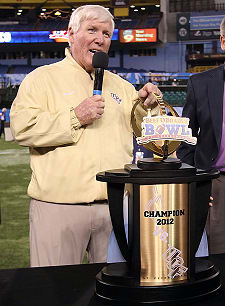UCF wins NCAA appeal of bowl ban, eligible in 2013

ORLANDO, Fla. (AP) - It wasn't an easy decision for UCF to challenge a ruling handed down by the NCAA.
It turned out to be a beneficial one, though.
Advertisement
The NCAA granted UCF's appeal of a one-year postseason ban in football on Monday, clearing the way for the Knights to be eligible for a bowl berth in their inaugural season in the American Athletic Conference in 2013.
It its report on the ruling, the NCAA wrote that its Infractions Appeals Committee "determined the football postseason ban is excessive such that it constitutes an abuse of discretion.'' UCF had argued in its written appeal that the NCAA used "irrelevant factors'' in conveying the postseason ban on its football program.
UCF football coach George O'Leary said having it overturned was vindication for an appeal he pressed school president John Hitt to submit after the Committee on Infractions slapped its football and basketball programs with a litany of penalties last year.
"I'm always gonna fight for the athletes if I feel it's justified,'' O'Leary said. "It came out to be a great decision, and it's something that you don't win very often.''
UCF's was originally issued the ban as part of sanctions levied last July for major recruiting violations in football and basketball. It also received a one-year postseason ban in basketball, $50,000 fine, five years' probation, reduction of basketball scholarships, and limits on football recruiting.
The postseason ban was the lone penalty UCF didn't accept and it allowed the Knights to participate in the Beef O'Brady's Bowl in 2012.
UCF presented its appeal of postseason ban in January.
Athletics director Todd Stansbury said that ultimately the decision to appeal was made because Hitt, he and others came to a consensus that "it was the right thing to do'' and that the facts presented by the NCAA in their opinion "didn't justify the penalties.''
"Obviously the fact that it's taken this long I think shows that they took it seriously, giving it its proper attention,'' Stansbury said. "Now we're ready to look forward and turn the page...This, I think closes out on where we've been and allows us to move forward into next season with a full-steam ahead attitude.''
The punishments stemmed from a 2011 NCAA investigation that found the programs were involved with runners for sports agents and making cash payments to recruits.
Former athletics director Keith Tribble and assistant football coach David Kelly were cited for unethical conduct by the NCAA last year and resigned. Tribble was given a three-year show-cause order and Kelly a one-year order. It means any institution that hires them in that time must prove to the NCAA that they are rules compliant.
Basketball coach Donnie Jones was also given a three-year show-cause order.
When the NCAA released the penalties on July 31, it was believed that UCF was simply delaying its bowl ban by a year because the organization doesn't often overturn its decisions.
But Hitt called the appeal "well-grounded'', noting that none of the players UCF was found to have recruited illegally ever actually played football at the school.
UCF is joining the newly-named American Athletic Conference, formerly the Big East, in all sports when it begins competing for the 2013-14 school year. Next season is also the final year of the conference's automatic qualifier status to the Bowl Championship Series in football.
The most immediate impact, though, will be felt in recruiting where O'Leary said his coaches had been hearing other schools were using UCF's possible postseason ban as a means to steer players away from UCF.
"You get rid of a negative,'' O'Leary said. "If you didn't win, it's all of a sudden now you're playing for the love of the game...Everything that was available to us this past year is still available for us.''